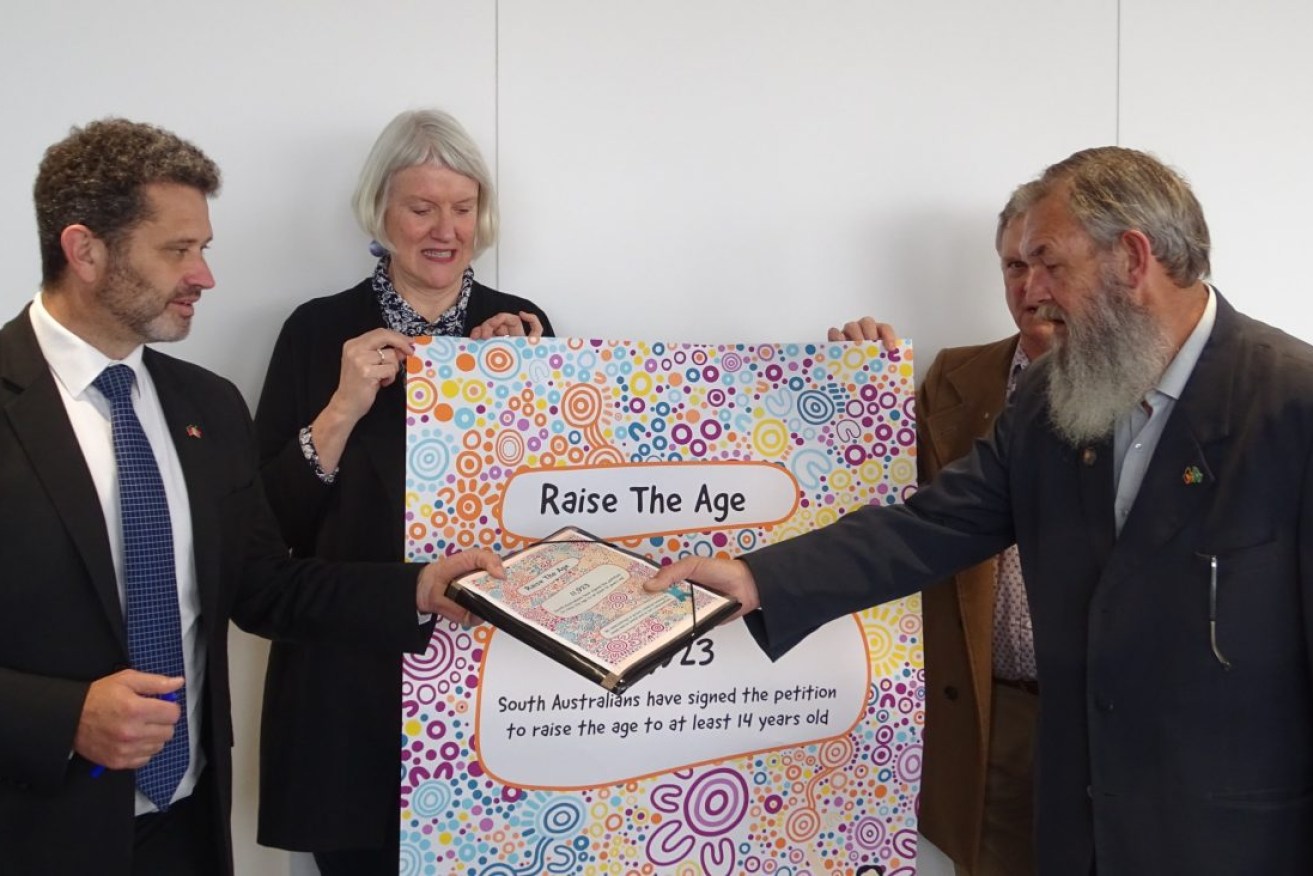Work underway to raise criminal age in SA
Attorney-General Kyam Maher says discussions to raise the age of criminal responsibility in South Australia from 10 to 14 are in train, after he received a petition with just under 12,000 signatures calling for the legislative change.

Attorney-General Kyam Maher (left) being presented with a petition to raise the criminal age in South Australia. Photo: Supplied
The Raise the Age campaign has gained significant traction in recent months, with petitions being presented to federal, state and territory attorneys-general in support of lifting the minimum age of criminal responsibility in Australia from 10 to at least 14.
Campaigners argue primary school-aged children do not have the mental capacity nor moral understanding to fully comprehend the consequences of their behaviour, and should not be charged with criminal offences and sentenced to detention.
South Australian campaigners last week presented Maher with a petition from 11,923 people calling for the state government to “change the laws to raise the age, so children aged 10 to 13 years are not sent to prison”.
South Australian Council of Social Service (SACOSS) CEO Ross Womersley, who was one of the campaigners who delivered the petition to Maher, said the number of signatures was a “signal of the fact that there is a wider group of people in our community that are thinking carefully about this issue”.
He said the next step of the campaign would likely involve groups including SACOSS holding a parliamentary briefing so that MPs could have a “real opportunity to dive into the issue and understand it more deeply”.
“We would expect that the government should take some leadership in this in ensuring that we are no longer locking up kids, criminalising kids under the age of 14,” he said.
“But, ensuring that both sides of the parliament understand this issue and see the importance of it remains a critical thing.”
Maher told InDaily that a bipartisan agreement had been reached by all states – led by both Labor and Liberal governments – to develop proposals to raise the age of criminal responsibility.
“Work continues at a national level, and in South Australia, in relation to proposals to raise the age, having regard to any carve outs, timing and discussion of implementation requirements,” he said.
“I was pleased to receive the petition and am continuing to progress this work.”
Under current South Australian law, children aged 10 to 14 are deemed incapable of understanding the full consequences of their actions, but that is a rebuttable presumption, meaning judges can convict them of criminal offences and sentence them to detention if their crimes are deemed serious.
In 2020-21, 43 primary school-aged children were incarcerated at the Kurlana Tapa youth detention centre at Cavan.
They were mostly Aboriginal, had disabilities and came from the child protection system.
Maher, who is also Aboriginal Affairs Minister, told parliament in May that lifting the age of criminal responsibility was an “important issue” and one that the government would “be turning [its] mind to”.
At the time, he noted that raising the age could help reduce the overrepresentation of Aboriginal children in youth detention.
But former Attorney-General Vickie Chapman previously argued that South Australia would “fail our children if we simply changed the law and raised the criminal age of responsibility, without addressing alternate supervision and support for 10 to 14-year-olds”.
Womersley said campaigners would push for the government to replace detention with “restorative justice” programs for children whose behaviour is considered criminal.
“(Restorative justice) is where people who are responsible for doing things that hurt other people have to actually meet that person and listen carefully to understand the impact of their behaviour,” he said.
“We think that’s a very powerful way of changing people’s behaviour and in many instances, it’s having mechanisms like that in place and available that will create the responsibility that prevents some of these young people from continuing to do inappropriate things.
“There are also some kids that find themselves in these positions because they have grown up in very traumatic households, or where they’ve experienced very high levels of trauma.
“For those kids, the issue is not lock them up and throw away the key, the issue is we need to get the very important therapeutic supports to them in order for us to support them to change their life trajectory.”
Womersley said ideally, campaigners would like the minimum age of criminal responsibility to be raised to 16.
“However, we recognise that that’s a big jump for everybody,” he said.
“We think that all of the evidence – medical, social and justice – points to the fact that if we actually stopped and had better responses for kids who are under the age of 14, we would change the trajectory of their lives in very profound ways.”
South Australian Aboriginal Community Controlled Organisation Network convenor Scott Wilson agreed that diversion programs needed to be put in place.
He said he was hopeful the South Australian Government would raise the criminal age to 14, but he suspected the government would only lift it to 12.
“That would be in line with what other states are talking about,” he said.
“We need to keep pressure on the South Australia state government to argue diversion programs not jail is the most cost effective measure for kids.”
The Greens in July reintroduced a private member’s bill to state parliament calling for the minimum age of responsibility to be lifted to 14.
If passed, all children aged under 14 in youth detention would be released from custody within a month of the legislation commencing.
The bill would also stop young people in detention from being kept in safe rooms for longer than 24 hours.




